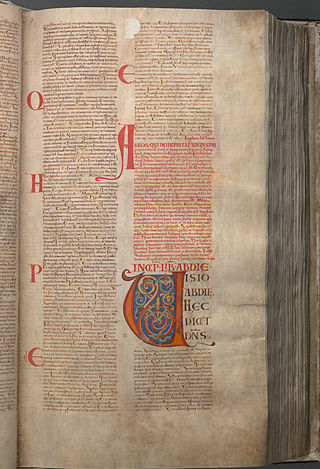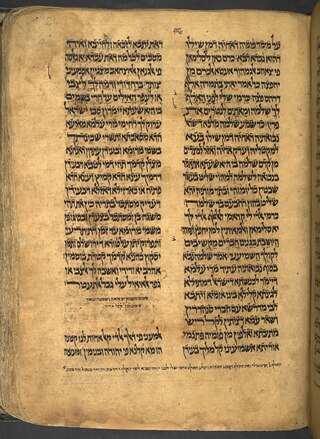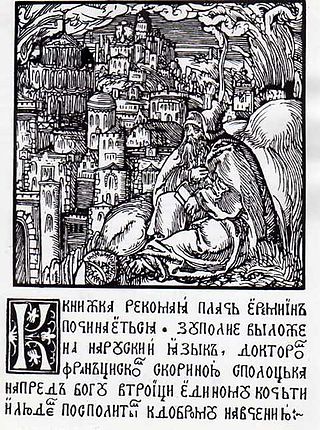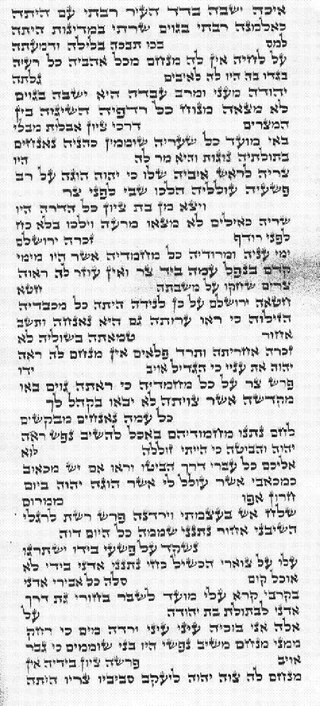Isaiah 27 is the twenty-seventh chapter of the Book of Isaiah in the Hebrew Bible or the Old Testament of the Christian Bible. This book contains the prophecies attributed to the prophet Isaiah, and is one of the Books of the Prophets. Chapters 24-27 of Isaiah constitute one continuous poetical prophecy, sometimes called the "Isaiah Apocalypse".
Isaiah 30 is the thirtieth chapter of the Book of Isaiah in the Hebrew Bible or the Old Testament of the Christian Bible. This book contains the prophecies attributed to the prophet Isaiah, and is one of the Books of the Prophets. The Jerusalem Bible groups chapters 28-35 together as a collection of "poems on Israel and Judah". The Cambridge Bible for Schools and Colleges describes this chapter as "a series of Oracles dealing with the Egyptian Alliance and its consequences; the present state and future prospects of Israel, and the destruction of the Assyrians".
Isaiah 56 is the fifty-sixth chapter of the Book of Isaiah in the Hebrew Bible or the Old Testament of the Christian Bible. This book contains the prophecies attributed to the prophet Isaiah, and is one of the Books of the Prophets. Chapter 56 is the first chapter of the final section of the Book of Isaiah, often referred to as Trito-Isaiah.

Amos 7 is the seventh chapter of the Book of Amos in the Hebrew Bible or the Old Testament of the Christian Bible. In the Hebrew Bible it is a part of the Book of the Twelve Minor Prophets. This book contains the prophecies attributed to the prophet Amos; in particular, the seventh, eighth, and ninth chapters contain visions and their explanations. This chapter contains three visions: the locusts, the fire, and the plumb-line. The visions are then "interrupted" by a narrative about Amos and his listeners in Bethel, before they continue in chapter 8.

Lamentations 2 is the second chapter of the Book of Lamentations in the Hebrew Bible or the Old Testament of the Christian Bible, part of the Ketuvim ("Writings").

Lamentations 3 is the third chapter of the Book of Lamentations in the Hebrew Bible or the Old Testament of the Christian Bible, part of the Ketuvim ("Writings").

Lamentations 4 is the fourth chapter of the Book of Lamentations in the Hebrew Bible or the Old Testament of the Christian Bible, part of the Ketuvim ("Writings").

Lamentations 5 is the fifth chapter of the Book of Lamentations in the Hebrew Bible or the Old Testament of the Christian Bible, part of the Ketuvim ("Writings").

Jeremiah 4 is the fourth chapter of the Book of Jeremiah in the Hebrew Bible or the Old Testament of the Christian Bible. This book contains prophecies attributed to the prophet Jeremiah, and is one of the Books of the Prophets. Chapters 2 to 6 contain the earliest preaching of Jeremiah on the apostasy of Israel.

Ezekiel 5 is the fifth chapter of the Book of Ezekiel in the Hebrew Bible or the Old Testament of the Christian Bible. This book contains the prophecies attributed to the prophet/priest Ezekiel, and is one of the Prophetic Books. This chapter contains the prophecies using the division of the prophet's shaved hair as a sign, showing God's judgment upon Jerusalem, by pestilence, by famine, by the sword, and by dispersion. The siege is described again in chapter 6.

Jeremiah 47 is the forty-seventh chapter of the Book of Jeremiah in the Hebrew Bible or the Old Testament of the Christian Bible. This book contains prophecies attributed to the prophet Jeremiah, and is one of the Books of the Prophets. This chapter is part of a series of "oracles against foreign nations", consisting of chapters 46 to 51. In particular, chapters 46-49 focus on Judah's neighbors. This chapter contains the poetic oracles against the Philistines.

Ezekiel 35 is the thirty-fifth chapter of the Book of Ezekiel in the Hebrew Bible or the Old Testament of the Christian Bible. This book contains the prophecies attributed to the prophet/priest Ezekiel, and is one of the Books of the Prophets. This chapter contains a prophecy against Mount Seir in Edom, to the south of Judah. Biblical commentator Susan Galambush pairs it with an oracle promising "restoration to the mountains of Israel" in the following chapter.

Jeremiah 18 is the eighteenth chapter of the Book of Jeremiah in the Hebrew Bible or the Old Testament of the Christian Bible. This book contains prophecies attributed to the prophet Jeremiah, and is one of the Books of the Prophets. This chapter includes the fourth of the passages known as the "Confessions of Jeremiah".

Jeremiah 19 is the nineteenth chapter of the Book of Jeremiah in the Hebrew Bible or the Old Testament of the Christian Bible. This book contains prophecies attributed the prophet Jeremiah, and is one of the Books of the Prophets.

Jeremiah 21 is the twenty-first chapter of the Book of Jeremiah in the Hebrew Bible or the Old Testament of the Christian Bible. This book contains prophecies attributed to the prophet Jeremiah, and is one of the Books of the Prophets. This chapter contains a record of Jeremiah's message to King Zedekiah's emissaries and a warning to the House of David.

Jeremiah 33 is the thirty-third chapter of the Book of Jeremiah in the Hebrew Bible or the Old Testament of the Christian Bible. It is numbered as Jeremiah 40 in the Septuagint. This book contains prophecies attributed to the prophet Jeremiah, and is one of the Books of the Prophets.

Jeremiah 26 is the twenty-sixth chapter of the Book of Jeremiah in the Hebrew Bible or the Old Testament of the Christian Bible. It is numbered as Jeremiah 33 in the Septuagint. This book contains prophecies attributed to the prophet Jeremiah, and is one of the Books of the Prophets. This chapter contains an exhortation to repentance, causing Jeremiah to be apprehended and arraigned ; he gives his apology, resulting the princes to clear him by the example of Micah and of Urijah, and by the care of Ahikam.

Jeremiah 46 is the forty-sixth chapter of the Book of Jeremiah in the Hebrew Bible or the Old Testament of the Christian Bible. This book contains prophecies attributed to the prophet Jeremiah, and is one of the Books of the Prophets. This chapter is part of a series of "oracles against foreign nations", consisting of chapters 46 to 51. In particular, chapters 46-49 focus on Judah's neighbors. This chapter contains the poetic oracles against Egypt.

Jeremiah 30 is the thirtieth chapter of the Book of Jeremiah in the Hebrew Bible or the Old Testament of the Christian Bible. It is numbered as Jeremiah 37 in the Septuagint. This book contains prophecies attributed to the prophet Jeremiah, and is one of the Books of the Prophets. The Jerusalem Bible refers to chapters 30 and 31 as "the Book of Consolation", and Lutheran theologian Ernst Hengstenberg calls these two chapters "the triumphal hymn of Israel’s salvation". This chapter contains the promises to restoration.

Jeremiah 42 is the forty-second chapter of the Book of Jeremiah in the Hebrew Bible or the Old Testament of the Christian Bible. This book contains prophecies attributed to the prophet Jeremiah, and is one of the Books of the Prophets. This chapter is part of a narrative section consisting of chapters 37 to 44. Chapters 42-44 describe the emigration to Egypt involving the remnant who remained in Judah after much of the population was exiled to Babylon. In this chapter, the leaders of the community ask Jeremiah to seek divine guidance as to whether they should go to Egypt or remain in Judah, but they are found to be hypocrites in asking for advice which they intended to ignore.












